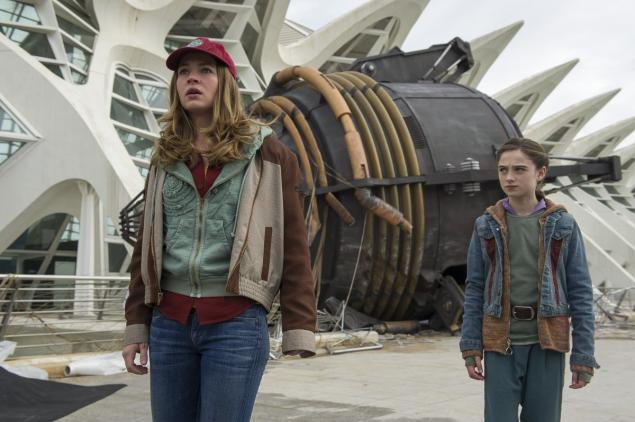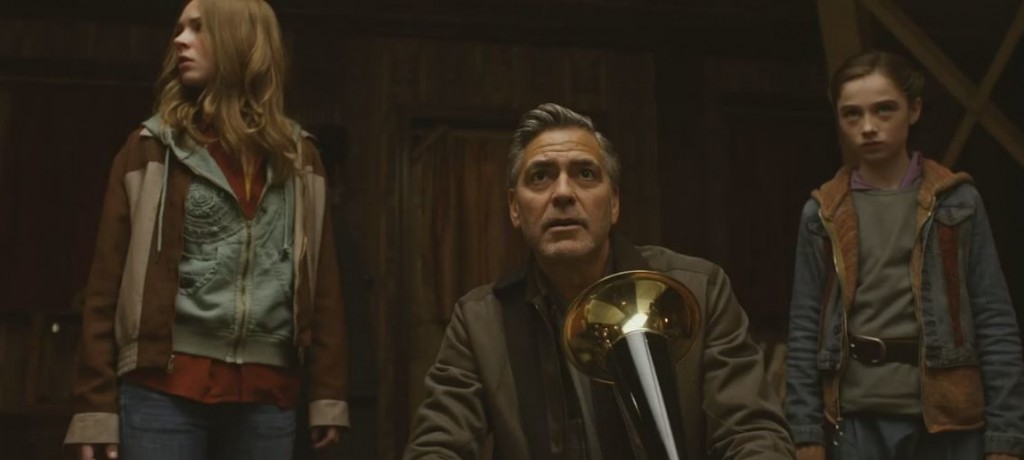It’s not a fluke that the number one movie of the summer, Mad Max: Fury Road, is a tale of love, redemption, and humanity set in a gasoline-and-sand post-apocalypse. Moviegoers are starving for glimpses of our next fifteen minutes, and we’ll take them wherever we can get them. This what the Ray Bradbury-inspired Tomorrowland is concerned with. Brad Bird’s unsteady but aspirational film is not a movie about the world that is coming, but, rather, our preoccupation with it.
Tomorrowland‘s opening minutes opt for largely unnecessary narration from our leads, teen genius Casey Newton (Britt Robertson) and cynical former boy genius Frank Walker (George Clooney). As a child at the 1964 World’s Fair, Walker met an enigmatic young girl named Athena (Raffey Cassidy), who lets him tag along on her return trip to Tomorrowland. Tomorrowland, an advanced alternate dimension parallel to our own, has kept tabs on humanity like a distantly protective big brother since the age of Tesla and Marconi. Walker, for reasons largely unknown, was banished from Tomorrowland. In the present day, Casey, the disenfranchised daughter of a former NASA engineer, spends her evenings attempting to sabotage the demolition of Cape Canaveral, and being largely ignored by her doom-saying teachers. Casey is an optimist, the film repeatedly tells us, something out of place in the film’s universe. Casey, Athena, and Walker are brought together when Casey is given a mysterious pin that gives her glimpses of Tomorrowland. Together, the trio spend the better part of the film evading sinister robots before finally confronting Tomorrowland regent Governor Nix (Hugh Laurie).
[Spoilers below]
My biggest issue with Tomorrowland is that it insists on leaving us in the dark for the better part of its running time. The film’s first act is squandered on setup that isn’t enormously necessary and could be trimmed down significantly.
However, this is a Disney movie that is conscious of its own deeply ingrained Disney aesthetics and concepts. We first see it in the film’s opening, when a pint-sized Frank Walker takes a hellish trip through the classic World’s Fair attraction “It’s A Small World After All,” now synonymous with Walt Disney. The film really finds its footing in an action sequence taking place in a pop culture junk store honeytrap set by the film’s mechanical villains, during which a Han Solo-in-Carbonite replica is used as a melee weapon. More specifically, though, Tomorrowland is a movie designed as a park attraction; Casey and Walker talk to us, the audience, directly at the beginning as if we’re about to take off for Space Mountain together. Many of the film’s non-human characters are explicitly referred to as animatronics. If anything, Tomorrowland feels less like a story and more an experience.
As Casey, Robertson is a strong lead cursed by a script that tells us to like her before we have a chance to on our own. Despite being a genius, we’re not really clear what Casey is good at. We know she wants to follow in her father’s steps at NASA, but her skills seem to be limited to “being pretty intuitive” and “breaking into stuff”. Clooney, on the other hand, graces the material with the kind of well-worn gruffness we’ve come to love and expect from him. He plays Walker’s failed child prodigy as a man intimately wounded by the promise of the future. When he angrily explains to Casey that her vision of Tomorrowland is “an invitation to a party that got cancelled,” you can feel the venom drip off his words.
The film’s most intriguing character is actually Raffey Cassidy’s Athena, whose calculating intelligence is hidden behind the cool blue eyes of a twelve-year-old. There’s a surprising complexity and tragedy to the character Cassidy is playing here: a mechanical Pinocchio attempting to fulfill a protocol long since discontinued, a redundant cog in the clockwork of the future. Former childhood sweethearts, the adult Clooney and pre-teen Cassidy’s scenes together as distant exes work because the film treats the subplot with genuine seriousness rather than easy gags. It’s a testament to the ice cold gravitas Cassidy brings to Athena that she is convincingly able to keep up with a veteran actor like Clooney, and their doomed, untenable romance gives Tomorrowland a beating heart. “You know why you never made me laugh, Frank?” a mortally wounded Athena tells him. “Because you’re not funny”.
One of the sharper criticisms thrown at Tomorrowland is that it’s preachy. That’s definitely true, but I’m not convinced that’s a bad thing here. This is a big budget summer blockbuster that points a sharp finger at the kind of longstanding 9/11 destruction porn exemplified by, say, this month’s Avengers: Age of Ultron or the forthcoming civilian slaughterfest San Andreas. It looks to its peers and demands that we ask more from what we imagine for ourselves. When a frustrated Governor Nix raves that humanity has settled for hopelessness “because it asks nothing of you,” you wonder if there isn’t a valid critique to be found there in our patterns of media consumption. Conversely, Nix’s own refusal to allow humanity safe passage into Tomorrowland as a means of avoiding the coming apocalypse because “they” will ruin things over here too is itself an indictment of the classicism and bigotry that comes with utopian thinking. Tomorrowland‘s (admittedly vague, but deliberately all-inclusive) call to arms—a demand that we expect more of ourselves, that we don’t shortchange our future and give in to despair—may be a stern lecture, but it’s one I believe we’ve earned for ourselves.
Tomorrowland is in theaters now.





